On April 21…
“The sight of Richthofen as I walked closer gave me a start. His face, particularly peaceful, had an expression of gentleness and goodness, of refinement. I went away. I did not feel like a victor.”
~ Capt. Arthur Roy Brown
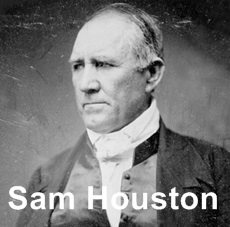
1836 – Six weeks after the Battle of The Alamo, Texian militia under Sam Houston launched a surprise attack against the forces of Mexican General Antonio López de Santa Anna along the San Jacinto River.
The Mexicans were thoroughly routed in just 18 minutes. While the Texian troops lost just 11 men in the battle, the Mexican army lost 610 men and 300 more were taken prisoner.
General Santa Anna – the President of Mexico – and General Martín Perfecto de Cos both escaped during the battle. Santa Anna was captured the next day and Cos on April 24.
After being held about three weeks as a prisoner of war, Santa Anna signed the peace treaty that dictated that the Mexican army leave the region, paving the way for the Republic of Texas to become an independent country.
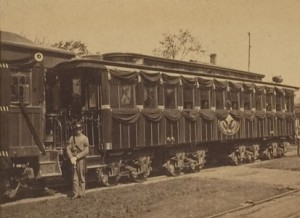
1865 – A train carrying the coffin of assassinated President Abraham Lincoln left Washington, D.C. on its way to Springfield, Illinois, where he would be buried on May 4.
The train traveled through 180 cities and seven states on its way to Lincoln’s home state of Illinois.
Scheduled stops for the special funeral train were published in newspapers. At each stop, Lincoln’s coffin was taken off the train, placed on an elaborately decorated horse-drawn hearse and led by solemn processions to a public building for viewing.

1910 – Samuel Langhorne Clemens, better known by his pen name Mark Twain, died of a heart attack at the age of 74.
Among his novels are The Prince and The Pauper, A Connecticut Yankee in King Arthur’s Court, and of course, The Adventures of Tom Sawyer and its sequel, Adventures of Huckleberry Finn.
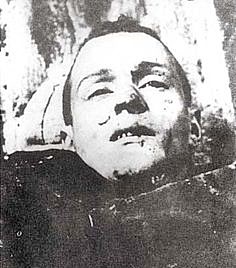
1918 – In the skies over Vaux sur Somme, France, Manfred von Richthofen, the notorious German flying ace known as “The Red Baron,” was killed by Allied fire. He was 25.
Richthofen had penetrated deep into Allied territory in pursuit of a British aircraft, piloted by Canadian pilot Lieutenant Wilfrid May. The Red Baron was flying near the ground when a single .303 bullet hit him, causing a fatal chest wound, penetrating from the right armpit and resurfacing next to the left side of his chest.
He managed to retain sufficient control to make a rough landing in a field on a hill near the Bray-Corbie road before dying.
Canadian pilot Captain Arthur Roy Brown was credited with the “kill” but it is now generally agreed that the bullet which hit Richthofen was fired from the ground. Brown’s attack was from behind and above, and from Richthofen’s left.
Even more conclusively, Richthofen could not have continued his pursuit of May for as long as he did (up to two minutes) had this wound come from Brown’s guns.
Richthofen was buried with full military honors for “our gallant and worthy foe” by members of the Royal Australian Air Force. His remains were later buried in the Richthofen family plot in Wiesbaden.
In a time of wooden and fabric aircraft, when 20 air victories ensured a pilot legendary status, Manfred von Richthofen had downed 80 enemy aircraft.
Please note there is no sound for this video…
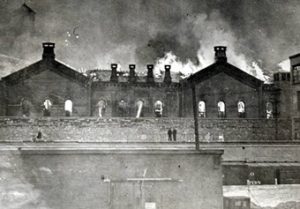
1930 – A fire at an Ohio prison in Columbus killed 320 inmates, some of whom burned to death when they were not unlocked from their cells.
The prison, built to hold 1,500 people, was consistently overcrowded and notorious for its poor conditions.
At the time of the 1930 fire, there were 4,300 prisoners living in the jail. The cell block adjacent to the scaffolding housed 800 prisoners, most of them already locked in for the night.
The inmates begged to be let out of their cells as smoke filled the cell block. However, most reports claim that the guards not only refused to unlock the cells, they continued to lock up other prisoners.
Meanwhile, the fire spread to the roof, endangering the inmates on the prison’s upper level as well.
Two prisoners finally forcibly took the keys from a guard and began their own rescue efforts. Approximately 50 inmates made it out of their cells before the heavy smoke stopped the impromptu evacuation. The roof then caved in on the upper cells.
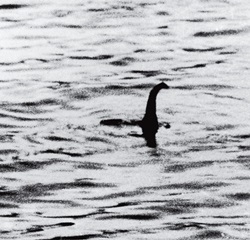
1934 – Supposedly taken by London gynecologist Robert Kenneth Wilson, the most famous photo allegedly showing the Loch Ness Monster was published in the Daily Mail.
Wilson’s refusal to have his name associated with it led to it being known as the “surgeon’s photograph”.
In 1999, it was revealed to be a hoax … Really? It took them 65 years to officially determine that?

1945 – Soviet forces fighting at Zossen, south of Berlin, assaulted the headquarters of the German High Command.
The only remaining opposing “force” to the Russian invasion of Berlin were the “battle groups” of Hitler Youth – teenagers with anti-tank guns, strategically placed in parks and suburban streets.
In a battle at Eggersdorf, 70 of these Hitler teens strove to fight off a Russian assault with a mere three anti-tank guns. They were bulldozed by Russian tanks and infantry. The “Thousand-Year Reich” was just days from collapse.
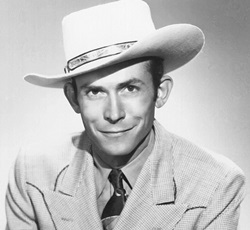
1947 – Hank Williams recorded the country-gospel classic I Saw The Light at Castle Studio in Nashville.
Williams was inspired to write the song in January 1947 while returning from a show in Fort Deposit, Alabama.
His mother, Lilly, drove him and his band back to Montgomery, AL that night. As she was approaching the city, she spotted the lights of Dannelly Field Airport.
Williams, who had been sleeping in the backseat of the car, was roused by his mother, who told him “I just saw the light,” announcing to him that they were close to Montgomery.
He wrote the first draft of the song that night.
The song was not a commercial success when it was released in 1948, but has since become his most recognized hymn and one of his most popular songs.

1959 – Johnny Mathis recorded Misty.
Misty Factoid: Originally composed as an instrumental by Erroll Garner in 1955, lyrics were later added by Johnny Burke and became one of the best known songs of Mathis’ career.
His version of the song was inducted into the Grammy Hall of Fame in 2002.

1962 – The Seattle World’s Fair (Century 21 Exposition) opened, highlighted by the now iconic Space Needle which had been built for the exposition.
With the “Space Race” underway and Boeing having “put Seattle on the map as an aerospace city,” a major theme of the fair was to show that the United States was not really “behind” the Soviet Union in the realms of science and space.
Cold War Factoid: Project manager Ewen Dingwall went to Moscow to request Soviet participation, but was turned down. Neither the People’s Republic of China, Vietnam nor North Korea were invited
As it happened, the Cold War had an additional effect on the fair. President John F. Kennedy was supposed to attend the closing ceremony of the fair on October 21, 1962. He bowed out, pleading a “heavy cold”; it later became public that he was dealing with the Cuban Missile Crisis.
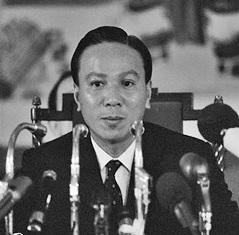
1975 – As Xuan Loc – the last South Vietnamese outpost blocking a direct North Vietnamese assault on Saigon – fell, Nguyen Van Thieu resigned as president of South Vietnam.
In his televised farewell speech, Thieu blasted the U.S., attacking “our great ally, [the] leader of the free world. The United States has not respected its promises. It is inhumane. It is not trustworthy. It is irresponsible. The United States did not keep its word. Is an American’s word reliable these days?”
He concluded his speech by saying “I resign, but I do not desert.”
Five days later, he fled to Taiwan.

1977 – Elvis Presley started what would be his final tour with an appearance in Greensboro, NC.
Jerry Kenison of the Greensboro Daily News, wrote a scathing review of the performance.
“Elvis was in no shape to start another grinding tour. There was no magic. The tremendous energy, humor, movement and emotion that characterized Presley’s 1972, 1974 and 1975 appearances here just weren’t on the stage much of the time. Elvis moved very slowly, giving the impression that sudden or extreme motion would be painful. No matter how much he seemed to be trying, Elvis’ energy was lagging. He mumbled through ‘Hound Dog,’ seeming not to care. He improvised on other old standards, missing notes here and there.”
Hindsight Is Always 20/20: What Elvis needed in 1977 was to stop touring and concentrate on regaining his physical and mental health. He deserves most of blame for what happened to him, of course, but fans who saw him on stage in his final years will always experience a soul-searching dilemma.
To save Elvis, would they have been willing to erase the memories of seeing him perform and hearing him sing on that final tour? The only thing that would have kept him from the grueling tour schedule that surely contributed to his death would have been if they had refused to attend his shows.
Admit it, there was not a chance of that happening.
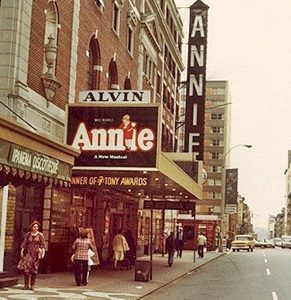
1977 – Annie opened at the Alvin Theatre (now the Neil Simon Theatre) on Broadway.
The musical starred Andrea McArdle as Annie, Reid Shelton as Daddy Warbucks, Dorothy Loudon as Miss Hannigan, and Sandy Faison as Grace Farrell.
It was nominated for eleven Tony Awards and won seven, including the Best Musical, Best Score, and Best Book.
The show closed on January 2, 1983, after a total of 2,377 performances.
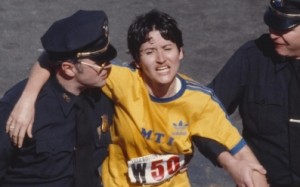
1980 – Rosie Ruiz, age 26, finished first in the women’s division of the Boston Marathon with a time of 2:31:56.
At the time, it was the fastest female time in Boston Marathon history as well as the third-fastest female time ever recorded in any marathon.
Eight days later, Ruiz was stripped of her victory after race officials learned she jumped into the race about a mile before the finish line.
Intervals Factoid: The first clue should have been the fact that Ruiz had no idea what “intervals” were in the post-race interview shown below.
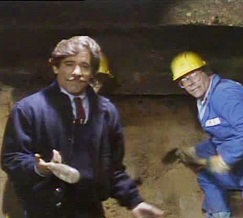
1986 – The Mystery of Al Capone’s Vaults was broadcast in syndication.
Hosted by Geraldo Rivera, the special centered on the opening of a secret vault in the Lexington Hotel in Chicago, which was once owned by gangster Al Capone.
When the vault was finally opened, the only things found inside were dirt and several empty bottles, including one Rivera claimed was for moonshine bathtub gin.
Although it gathered criticism and became infamous for its disappointing ending, the program was the most-watched syndicated television special that year with an estimated audience of 30 million.
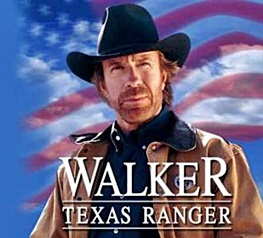
1993 – Walker, Texas Ranger premiered on CBS.
The action-crime series starred Chuck Norris as a Texas Ranger and ran for eight seasons.
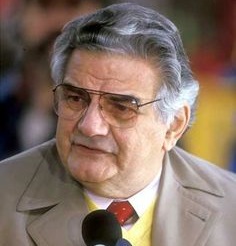
1996 – Jimmy Snyder, better known as Jimmy the Greek, died of a heart attack at the age of 77.
A Las Vegas bookmaker and television sports commentator (NFL Today), Snyder had lost his television job in 1988 after making insensitive (understatement) racial comments during a television interview
“The black is a better athlete to begin with because he’s been bred to be that way … this goes back all the way to the Civil War when during the slave trade, the slave owner would breed his big black to his big woman so that he could have a big black kid.“
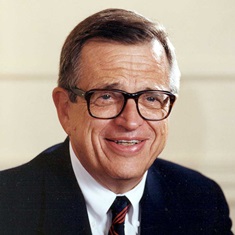
2012 – Charles Colson, Special Counsel to President Richard Nixon, died from complications resulting from a brain hemorrhage. He was 80.
Once known as Nixon’s “hatchet man,” Colson gained notoriety at the height of the Watergate scandal, for being named as one of the Watergate Seven, and pleaded guilty to obstruction of justice for attempting to defame Pentagon Papers defendant Daniel Ellsberg.
In 1974, he served seven months in the federal Maxwell Prison in Alabama as the first member of the Nixon administration to be incarcerated for Watergate-related charges.

2016 – Singer/songwriter Prince died of an accidental overdose of fentanyl. He was 57.
In a career spanning four decades, Prince sold over 150 million records worldwide, making him one of the best-selling music artists of all time.
He had thirty-one Billboard Top 40 singles and won seven Grammy Awards, a Golden Globe Award, and a Best Original Song Score Academy Award for the 1984 film Purple Rain.
He was inducted into the Rock and Roll Hall of Fame in 2004.
Sometimes it snows in April
Sometimes I feel so bad
Sometimes I wish that life was never ending
But all good things, they say, never last
Originally recorded on April 21, 1985
Exactly 31 years before his death
Compiled by Ray Lemire ©2020 RayLemire.com. / Streamingoldies.com. All Rights Reserved.